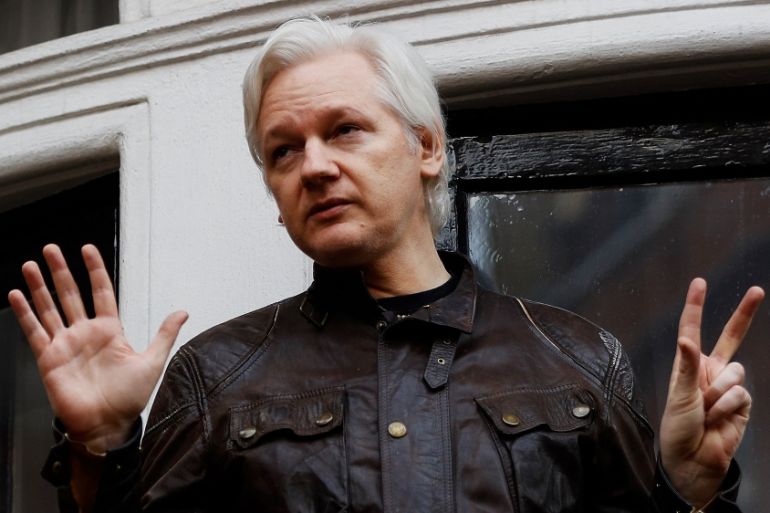Ecuador cuts Julian Assange’s internet access at London embassy
Founder of whistle-blower website holed up at Ecuador’s embassy in London for nearly six years now, faces fresh curbs.

Ecuador has cut off Julian Assange‘s communications with the outside world from its London embassy, where the founder of the whistle-blower website WikiLeaks has been living for nearly six years.
In a statement, the government of Ecuador said that it had acted because Assange had breached “a written commitment made to the government at the end of 2017 not to issue messages that might interfere with other states”.
Keep reading
list of 4 itemsUK ruling on Julian Assange ‘killing him slowly’, say free speech advocates
UK court opens way for Assange to appeal US extradition
Julian Assange US extradition ruling updates: Assange wins brief reprieve
According to the statement, Assange’s recent behaviour on social media “put at risk the good relations Ecuador maintains with the UK, with other states of the European Union, and with other nations”.
The government acted after Assange tweeted critically on Monday of Britain’s accusation that Russia was responsible for the nerve agent poisoning of a Russian former double agent and his daughter in the city of Salisbury earlier this month.
Assange also questioned the decision by the UK and more than 20 other countries to expel 150 Russian diplomats they claim are spies.
(1/3) The manner of and timing of Russian diplomatic expulsions is poor diplomacy. The expulsions occurred 12 hours after one of the worst building fires in post Soviet history, which killed at least 64. Russians will see the timing as gratuitous.
— Defend Assange Campaign (@DefendAssange) March 26, 2018
This is not the first time Ecuador cuts off Assange’s internet access. The same thing happened in October 2016 amid fears that Ecuador would be sucked into efforts to interfere in the American election by the activities of the WikiLeaks founder.
Ecuador said it was not evicting Assange from its embassy and that its “temporary restriction” of internet services “does not prevent the WikiLeaks organization from carrying out its journalistic activities”.
The move was clearly intended to keep the embassy from being the control centre for leaking operations.
Julian Assange went to the embassy in 2012 to avoid extradition to Sweden to face questioning about rape allegations, which he denies.
Sweden dropped the case last May because too much time had passed.
Fears of arrest
Assange still faces a British charge for skipping bail and fears being arrested and deported to the US.
Jeff Sessions, US attorney general, said last year that arresting Assange was “a priority”.
Maria Fernanda Espinosa, Ecuador’s foreign minister, said on Wednesday that officials would meet in London next week with Assange’s lawyers to explore additional measures in connection to what she branded as Assange’s “noncompliance” with his agreement not to meddle in foreign affairs.
Assange’s recent tweets, posted on Tuesday, respond to an insult from Alan Duncan, a minister of state at the British Foreign Office, who called Assange a “miserable little worm”.
Duncan told members of parliament “it’s about time that this miserable little worm walked out of the embassy and gave himself up to British justice”.
As a political prisoner detained without charge for 8 years, in violation of 2 UN rulings, I suppose I must be "miserable"; yet nothing wrong with being a "little" person although I'm rather tall; and better a "worm", a healthy creature that invigorates the soil, than a snake.
— Defend Assange Campaign (@DefendAssange) March 27, 2018
In December, Ecuador granted Assange citizenship and Espinosa called the measure “one more ring of protection” for Assange.
In January she said that Ecuador would continue to pursue a dialogue with the UK to eventually remove Assange from the embassy.
Earlier this week Espinosa said: “The most important thing is that Ecuador maintains a dialogue with the United Kingdom to find a definitive and lasting solution to this situation that the current government has inherited.”